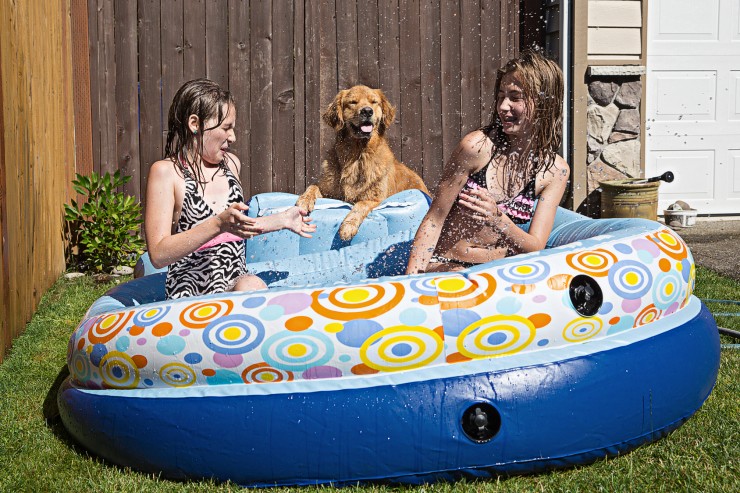
When it comes to treating the pet with cancer, owners truly have a number of options. The reason for the large amount of options is that there is truly no one "best" treatment for every pet. I share the holistic belief that each pet is an individual, and must be treated as such. I discuss this philosophy with owners right from the start. What worked for the last dog or cat I treated may not work for their pets. Additionally, each owner is different and has different wants and a different budget for the pet's medical care. Some owners want to do everything possible for the pet. Money is not an object, and they will often allow us to experiment and try quite a number of unique treatments. Others opt for a bit less, and may only choose surgery or one round of chemotherapy. Still others never want any conventional medications, but will only opt for more natural therapies such as herbal therapy or homeopathy.
I should point out before proceeding that the truly holistic view, desired by most pet owners, involves looking at ALL options and choosing what works best with the fewest side effects. I'm a conventional doctor by training, and use many conventional therapies in my practice. Whenever possible, I like to integrate as many different therapies as possible, as the best results (at least in my practice) occur when conventional therapies are combined with complementary therapies. Chemotherapy is usually not harmful and unlike the situation in people, rarely causes significant side effects in pets. Additionally, unless there is no proven chemotherapy to treat your pet’s type of cancer, chemotherapy is needed to put pets into remission quickly. Then once in remission, the supplements (designed to help boost the pet’s immune system as well as counteract side effects of chemotherapy) can do their job most effectively. In some cases chemotherapy may be my only option, as the cancer patient in question may not take all of the supplements I recommend to help him. While not ideal, we must accept the fact that every owner is different in what he or she will choose for the pet, and every pet is different in what he or she will let us do to help fight the cancer. Some pets are easy to medicate and can take many herbal and homeopathic supplements several times a day, whereas others will never take anything by mouth, complicating our effort at developing the “perfect” treatment plan. The holistic approach simply means looking at all of our available treatment options and choosing what works best for each specific patient.
When trying to do the best, most natural and holistic treatment for the pet, it would be wise to consider all options before settling just on one particular therapy. The best treatment for many pets with cancer is usually a rational combination of both conventional and complementary therapies. I believe that what I do, combine and offer both conventional and complementary therapies to owners, combines the best of both worlds. By knowing the pro's and cons of both types of medical care, the owner and I can work together and pick the therapy that they are most comfortable with, and that is most beneficial to the pet. Keep in mind too, that "holistic" doesn't necessarily mean "alternative." A truly holistic approach looks at trying to heal the entire pet, and not just cover up symptoms. A truly holistic approach chooses what's best for the pet, trying to give the pet relief while minimizing side effects. Conventional cancer therapies can be a part of the holistic approach to the treatment of cancer IF the goal is to help the pet become a healthier pet and not just cover up symptoms while ignoring the pet's well being.
There are some problems I have with the strictly conventional approach of diagnosing and treating cancer. Often, by ignoring the holistic approach to treatment, we are treating the cancer and not the pet. Simply choosing conventional therapies without regard for treating the entire pet is not in the pet's best interest. For pets with cancer, nutritional support by feeding the best diet is important. Nutritional supplements may be useful to boost the immune system and help the pet recruit its natural ability to fight cancer. Using complementary therapies such as glutamine supplementation may also be helpful to reduce the side effects such as vomiting or diarrhea that may occur with some types of chemotherapy or radiation therapy.
Finally, it is very important to understand that in treating the pet with cancer we must actually TREAT THE PET and not simply TREAT THE CANCER. DON’T FORGET THAT THERE IS A PET ATTACHED TO THE TUMOR! For this reason, part of the holistic approach to treating cancer involves supporting the entire pet’s body. This may mean using supplements to support the liver, the gastrointestinal system, and any other organ or system of the body. The only way to win the war against cancer is to make the pet as healthy as possible while we’re treating the cancer.
To learn more about using natural therapies to help treat and prevent cancer in your pet, check out my new book The Natural Vet’s Guide to Preventing and Treating Cancer in Dogs (it’s also a great book for cat owners too!) And don’t forget to check my website, www.petcarenaturally.com for more information on using natural therapies to keep your pet healthy.
 How Do Police And Military Dogs Interact With Their Handlers And Trainers?
How Do Police And
How Do Police And Military Dogs Interact With Their Handlers And Trainers?
How Do Police And
 6 Medical Reasons Why Your Dog May Be Overweight
6 Medical Reasons
6 Medical Reasons Why Your Dog May Be Overweight
6 Medical Reasons
 Has Your Horse Got A Hearing Problem?
Has Your Horse Go
Has Your Horse Got A Hearing Problem?
Has Your Horse Go
 Summer Safety Tips - Your Dog And Your Paddling Pool
Summer Safety Tip
Summer Safety Tips - Your Dog And Your Paddling Pool
Summer Safety Tip
 Points To Consider While Buying Dog Leads
Points To Consider While Buying Dog Leads
When
Points To Consider While Buying Dog Leads
Points To Consider While Buying Dog Leads
When
Copyright © 2005-2016 Pet Information All Rights Reserved
Contact us: www162date@outlook.com